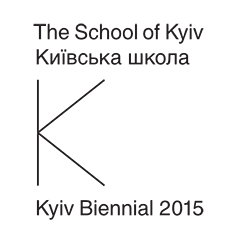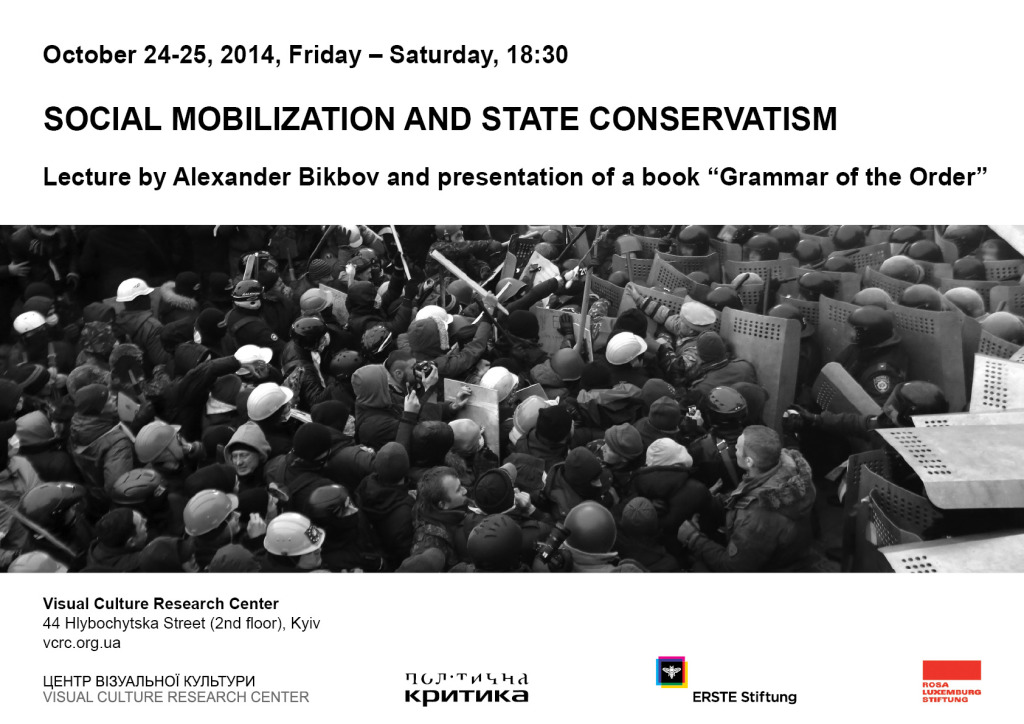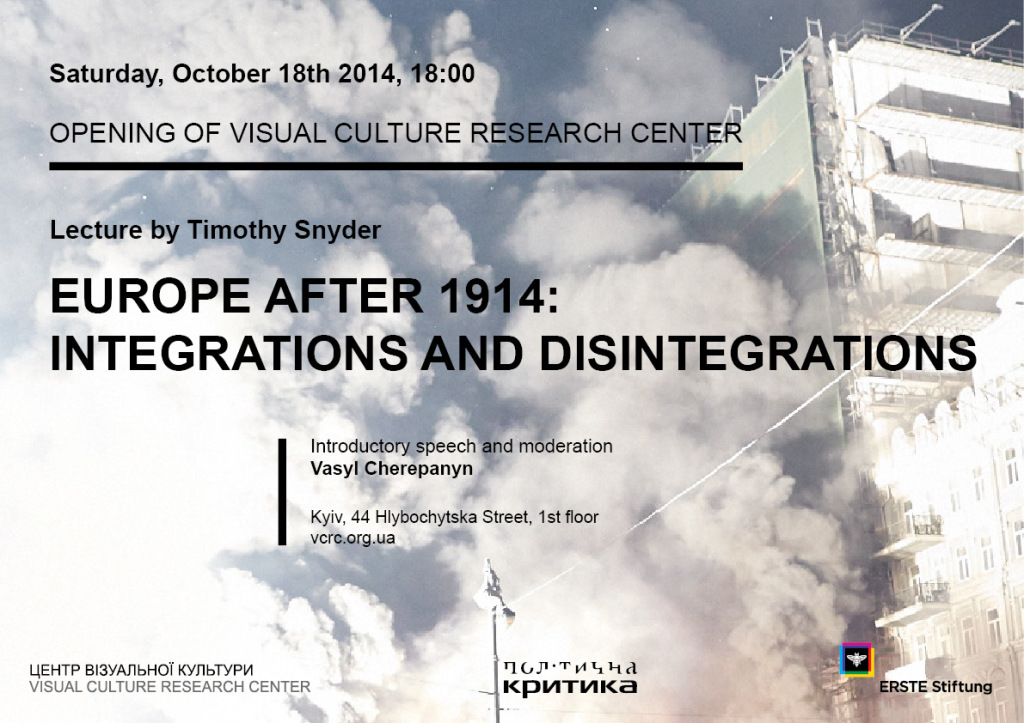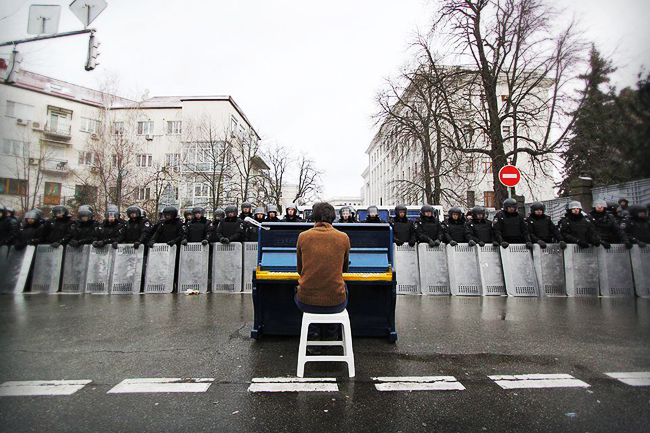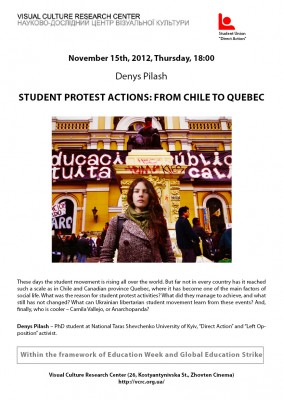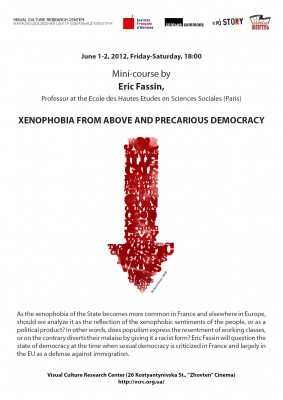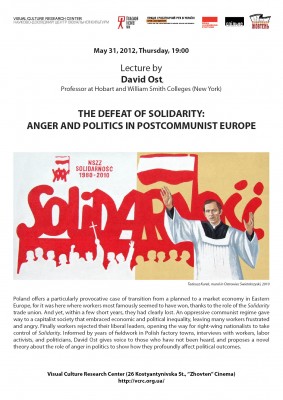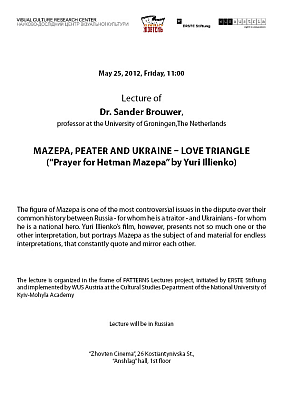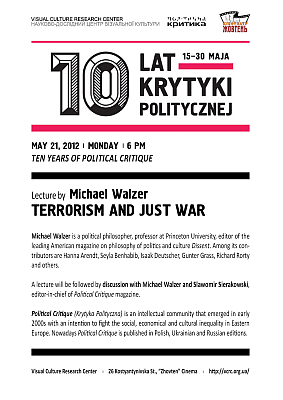Alexandr Bikbov “Social Mobilization and State Conservatism”
October 24-25, Friday – Saturday
(44 Hlybochytska Street (2nd floor), Kyiv)
Social Mobilization and State Conservatism
Lecture by Alexander Bikbov and presentation of a book “Grammar of the Order”
Visual Culture Research Center invites you to the lecture “Social Mobilization and State Conservatism” by sociologist Alexander Bikbov, and also to the presentation of his book “Grammar of the Order”. In his talks he will analyze the latest civil protests in Russia, taking into consideration analogous events in Spain, Egypt, USA, Greece, and Brazil, as well as present new research discipline – historical sociology of concepts.
On Friday, October 24 at 18:30 Alexander Bikbov will take part in the presentation of the book “Grammar of the Order” (Moscow, 2014). This book is a result of longtime research of the Soviet and Russian societies and a fundamental introduction to the historical sociology of concepts. The author explains Russian social order of the last 20 years through the social cooperation and struggle, which evolve around such concepts as “middle class”, “democracy”, “Russian science”, “Russian nation” etc. The research also deals with Russian protest actions, which started in 2011. Moderation of the presentation – Lesia Kulchynska.
On Saturday, October 25 at 18:30 Alexander Bikbov will deliver a lecture “Social Mobilization and State Conservatism”. Bikbov considers civil protests of 2011 – 2013 in the context of interrelation between violent and non-violent movements: “Forms and political consequences of civil violence, which have called into question the state monopoly for violence, are still poorly analyzed. Even less obvious is a connection between the structure of the civil protest and state violence, which is being implemented not only in the form of “antiterrorist” laws and police prosecution for activism, but also in the incentive form of working conditions, public funding etc. When in European and Latin American protests the critique of state neo-liberalism was clearly articulated, in post-Soviet countries this connection is less visible. However, Russian and maybe Ukrainian experience give many reasons to reveal it”. Moderation of the discussion – Vasyl Cherepanyn.
Alexander Bikbov – sociologist, researcher, editor of Logos magazine, associate member of Centre Maurice-Halbwachs (Paris), deputy director of Centre for Contemporary Philosophy and Social Sciences in Moscow State University. Scientific coordinator of the Independent Research Initiative for the study of mass protest movements in Russia. Personal website: http://a.bikbov.ru/.
Visual Culture Research Center (44 Hlybochytska Street, Kyiv)
Admission is free
ATTENTION! Seats are limited
Events will take place with support from: Krytyka Polityczna (Poland), ERSTE Foundation (Austria), Rosa Luxemburg Stiftung (Germany).
Contacts:
096 492 96 00 (Nataliya Neshevets)
vcrc@vcrc.org.ua
www.facebook.com/vcrc.org.ua
Opening of Visual Culture Research Center: Lecture by Timothy Snyder
Saturday, October 18th, 18:00
Visual Culture Research Center (44 Hlybochytska Street, Kyiv)
Visual Culture Research Center invites you to the opening of our new premises, which will be held on Saturday, October 18th at the address 44 Hlybochytska Street (1st floor). During the opening, Professor Timothy Snyder (Yale University) will deliver a lecture. Vasyl Cherepanyn, head of Visual Culture Research Center, will make an introductory speech and will also moderate a discussion with the participation of Timothy Snyder.
Visual Culture Research Center (VCRC) was founded in 2008 for the purpose of creating the interdisciplinary platform for analysis of the Ukrainian post Soviet condition at the intersection of art, knowledge, and politics. Since its inception VCRC has organized over 150 debates, conferences and seminars with the participation of Ukrainian and international researchers, as well as nearly 20 art exhibitions.
American historian and publicist Timothy Snyder is one of the major researchers of Central and Eastern European history, as well as the Holocaust. In his lecture “Europe after 1914: Integrations and Disintegrations” Timothy Snyder will consider historical origins of the 2013 – 14 Ukrainian crisis.
Timothy Snyder: “Contemporary European history can be understood as a series of integrations and disintegrations, continuing before our eyes in the present day. 1914 was not the end of an old Europe, but the continuation of a process of decolonization within Europe itself. 1939 was not a collapse of civilization, but the crowning moment of Soviet and Nazi attempts to colonize Europe from within. The project of European integration known as the EU succeeded as traditional maritime colonialism failed. The revolutions of 1989 allowed European states with different histories of colonialism and decolonialism to join in a single project. Today the EU stands challenged by a deliberate policy of disintegration known as Eurasia; as so many times before, Ukraine is in the middle”.
Timothy Snyder is a professor of history at Yale University, author of numerous works in Central and Eastern European history. He writes for International Herald Tribune, New York Review of Books, The New Republic, Eurozine and other periodicals. His books Bloodlands: Europe Between Hitler and Stalin, The Red Prince: The Secret Lives of A Habsburg Archduke, and Ukrainian History, Russian Politics, European Future were published in Ukrainian. In 2014 Timothy Snyder has written numerous polemical texts about political and military crisis in Ukraine.
Vasyl Cherepanyn is the director of the Visual Culture Research Center, teacher at the Cultural Studies Department at National University of “Kyiv-Mohyla Academy”, PhD in art history. He is an editor of the Ukrainian version of Political Critique magazine.
Working language – English
Admission is free
ATTENTION! Seats are limited
Contacts:
+380674422389 (Oleksiy Radynski)
vcrc@vcrc.org.ua
www.facebook.com/vcrc.org.ua
Visual Culture Research Center is supported by
Erste Foundation and Political Critique
Ukraine: Thinking Together
Ukraine: Thinking Together
Kyiv, 15-19 May
Manifesto
This is an encounter between those who care about freedom and a country where freedom is dearly won. This year Ukraine has seen protests, revolution, and a counter-revolution from abroad. When millions of people gathered to press for the rule of law and closer ties to Europe, the Yanukovych regime answered with violence. Vladimir Putin offered the Ukrainian government money to clear the streets and join Russia in a Eurasian project. Yanukovych criminalized civil society, which only broadened the protests. Then the police began to kill the protestors in large numbers. This brought revolution, a shift of political power to parliament, and the promise of free elections. Russian authorities reacted by invading Crimea, sending provocateurs into eastern Ukraine, threatening to dismember the country, and suppressing Russian civil society. Ukraine today, like Czechoslovakia in 1938, is a pluralist society amidst authoritarian regimes, a fascinating and troubled country poorly understood by its neighbors. It is also home to an extraordinary tradition of civil society, and to gifted writers, thinkers, and artists, many of whom, reflecting on the Maidan, have raised in new ways fundamental questions about political representation and the role of ideas in politics.
In the middle of May, an international group of intellectuals will come to Kyiv to demonstrate solidarity, meet their Ukrainian counterparts, and carry out a broad public discussion about the meaning of Ukrainian pluralism for the future of Europe, Russia, and the world. The Maidan and reactions to it, in Ukraine and abroad, raise classical and contemporary questions of politics and ethics. How can human rights be grounded and how are we motivated by the idea of human rights? How and when does language provide access to the universal, and how and when does it define political difference? Are some experiences so intense that they alter the character of intellectual exchange as such? How is decency in politics possible amidst international anarchy, domestic corruption, and the general fallibility of individuals? Does revolution renew Europe and revive political thought or can revolution, like everything else, be consumed by the clichés and abstractions of globalization? What does the revival of geopolitics mean for the world order? Is the Maidan an eruption of youth or an expression of history? Does its memory bring Ukrainians closer to European preoccupations, or introduce constellations that confound myths? These will be the subjects of our seven panels, in all of which international and local intellectuals will meet. The discussions will take place in Ukrainian, Russian, German, Polish, French, and English, and in all panels at least one person, including those traveling from the west, will be speaking a language that is not his or her own mother tongue. In this way we hope to express our respect for language as such, and to demonstrate, in a small way, solidarity to Ukrainiansand others who speak multiple languages. In expressing ourselves in other languages we also stress that the universal themes require a special sort of work from all of us, a labor that we hope will be rewarded by understanding and friendship.
Program
Thursday May 15
5:00pm Public Lecture by Timothy Snyder
Not Even Past: Ukrainian Histories, Russian Politics, European Futures
Site: Congregation Hall, Old University Building, Kyiv Mohyla Academy
Friday May 16
12:00 Press conference
Timothy Snyder, Leon Wieseltier, international guests
Site: Hotel Ukraina, Media Crisis Center
5:45pm Public Lecture by Bernard-Henri Lévy
La résistible ascension d’Arturo Poutine
In French with simultaneous translation to Ukrainian
Site: Congregation Hall, Old University Building, Kyiv Mohyla Academy
Saturday May 17
9:00am Opening remarks by Leon Wieseltier and Timothy Snyder
Site: Diplomatic Academy
9:30am Panel One
Do rights make us human?
Language: Russian, with simultaneous interpretation into English.
Site: Diplomatic Academy
Participants: Ivan Krastev, chair, Viktor Erofeyev, Sergei Lukashevsky, Myroslav
Marynovych, Alexander Podrabinek, Ihor Shchupak, Josef Zissels.
1:30pm Panel Two
How did the Maidan change culture?
Language: Ukrainian, with simultaneous interpretation into English.
Site: Diplomatic Academy
Participants: George Grabowicz, brief introduction, Ola Hnatiuk, chair, Vasyl Cherepanyn, Oksana Forostyna, Alexander Roitburd, Konstantin Skorkin, Olena Styazhkina, Serhiy Zhadan.
3:00 Coffee break
4:00pm Panel Three
When do politicians become pariahs?
Language: German, with simultaneous interpretation into Ukrainian and English.
Site: Diplomatic Academy
Participants: Daniel Markovits, chair, Wolf Biermann, Timothy Garton Ash, Jurko Prochasko, Mykhailo Minakov, Karl Schlögel, Karel Schwarzenberg.
5:30pm Public lecture by Ivan Krastev
The Global Politics of Protest
Site: Congregation Hall, Old University Building, Kyiv Mohyla Academy
7:00pm Public lecture by Timothy Garton Ash
From Lisbon to Kyiv?
Forty Years of Non-Violent European Struggles for Freedom
Site: Congregation Hall, Old University Building, Kyiv Mohyla Academy
Sunday May 18
9:30am Panel Four
Does Europe need Ukrainian revolution?
Language: French, with simultaneous interpretation into Ukrainian and English.
Site: Diplomatic Academy
Participants: Konstantin Sigov, chair, Carmen Claudin, Bernard Kouchner, Bernard-Henri Lévy, Volodymyr Yermolenko.
11:30am Public lecture by Slavenka Drakulić
Intellectuals as Bad Guys?
The Role of Intellectuals in the Balkan Wars
Site: Center for Polish and European Studies, Building 6, Kyiv Mohyla Academy
1:30pm Panel Five
Geopolitics after Crimea: Realism, Idealism, Eurasianism
Language: English, with simultaneous interpretation into Ukrainian.
Site: Diplomatic Academy
Participants: Leon Wieseltier, chair, Paul Berman, Carl Gershman, François Heisbourg, Volodymyr Kulyk, Anton Shekhovtsov, Tatiana Zhurzhenko.
3:00pm Coffee break
4:00pm Panel Six
Has totalitarianism returned to political thought and practice?
Language: Polish, with simultaneous interpretation into Ukrainian and English.
Site: Diplomatic Academy
Participants: Aleksander Smolar, chair, Agnieszka Holland, Adam Michnik, Mykola Riabchuk, Marci Shore, Sławomir Sierakowski, Andrzej Waśkiewicz.
6:30pm Public lecture by Paul Berman
Alexis de Tocqueville and the Idea of Democracy
Site: Congregation Hall, Old University Building, Kyiv Mohyla Academy
Monday 19 May
9:30am Panel Seven
Can memory save us from history? Can history save us from memory?
Language: English, with simultaneous interpretation into Ukrainian
Site: Diplomatic Academy
Participants: Timothy Snyder, chair, Slavenka Drakulić, Olga Filippova, Frank Foer, Yaroslav Hrytsak, Nikolay Koposov, Martin Šimečka, Andrey Kurkov.
11:00am Closing remarks by Timothy Snyder. End of public events.
12:00 Press conference
Hotel Ukraina
Locations:
The Kyiv-Mohyla Academy is located in the Podil’ neighborhood, on Kontraktova Square; the entrance to the Center for Polish and European Studies is on Voloska Street 8/5. The Diplomatic Academy is in central Kyiv, at 2 Velyka Zhytomyrska Street. The Hotel Ukraine is on 4 Instytutska Street. The InterContinental Hotel is on 2A Velyka Zhytomyrs’ka Street.
Practical solidarity:
This gathering was the initiative of Leon Wieseltier of The New Republic and Timothy Snyder of Yale University and was made possible by the willingness of colleagues to heed their call and agree to participate in great haste, and by the creativity and hard work of Tatiana Zhurzhenko and Oksana Forostyna. A number of partner institutions helped transform an idea into an event: the Batory Foundation, the Embassy of Canada, the Embassy of France, the Embassy of the Federal Republic of Germany, the Embassy of the Republic of Poland, the Embassy of the United States of America, the European Endowment for Democracy, the Network of European Cultural Journals Eurozine, the Goethe-Institut, the Institut Français d’Ukraine, the Institute for Human Sciences (IWM), the International Renaissance Foundation, the Ukrainian cultural journal Krytyka, the National University “Kyiv Mohyla Academy,” the Ministry of Culture of Ukraine, the Ministry of Foreign Affairs of Ukraine, the National Endowment for Democracy, The New Republic, the Open Ukraine Foundation, the PinchukArtCentre, the Ukrainian Institute for Holocaust Studies “Tkuma,” the Ukrainian Jewish Encounter, and the Visual Culture Research Center.
(Українська) Повернути собі місто. Лекція московського вуличного художника Кіріла Кто
Student Protest Actions: from Chile to Quebec
Lecture by Denys Pilash
November 15th, 2012, Thursday, 18:00
These days the student movement is rising all over the world. But far not in every country has it reached such a scale as in Chile and Canadian province Quebec, where it has become one of the main factors of social life. What was the reason for student protest activities? What did they manage to achieve, and what still has not changed? What can Ukrainian libertarian student movement learn from these events? And, finally, who is cooler – Camila Vallejo, or Anarchopanda?
Denys Pilash – PhD student at National Taras Shevchenko University of Kyiv, “Direct Action” and “Left Opposition” activist.
Within the framework of Education Week and Global Education Strike
XENOPHOBIA FROM ABOVE AND PRECARIOUS DEMOCRACY
Mini-course by Eric Fassin, Professor at the Ecole des Hautes Etudes en Sciences Sociales (Paris)
June 1-2, 2012, Friday-Saturday, 18:00
As the xenophobia of the State becomes more common in France and elsewhere in Europe, should we analyze it as the reflection of the xenophobic sentiments of the people, or as a political product? In other words, does populism express the resentment of working classes, or on the contrary diverts their malaise by giving it a racist form? Eric Fassin will question the state of democracy at the time when sexual democracy is criticized in France and largely in the EU as a defense against immigration.
THE DEFEAT OF SOLIDARITY: ANGER AND POLITICS IN POSTCOMMUNIST EUROPE
Lecture by David Ost, Professor at Hobart and William Smith Colleges (New York)
May 31, 2012, Thursday, 19:00
Poland offers a particularly provocative case of transition from a planned to a market economy in Eastern Europe, for it was here where workers most famously seemed to have won, thanks to the role of the Solidarity trade union. And yet, within a few short years, they had clearly lost. An oppressive communist regime gave way to a capitalist society that embraced economic and political inequality, leaving many workers frustrated and angry. Finally workers rejected their liberal leaders, opening the way for right-wing nationalists to take control of Solidarity. Informed by years of fieldwork in Polish factory towns, interviews with workers, labor activists, and politicians, David Ost gives voice to those who have not been heard, and proposes a novel theory about the role of anger in politics to show how they profoundly affect political outcomes
Mazepa, Peater and Ukraine – love triangle
(“Prayer for Hetman Mazepa” by Yuri Illienko)
Lecture of Dr. Sander Brouwer,professor at the University of Groningen,The Netherlands
May 25, 2012, Friday, 11:00
The figure of Mazepa is one of the most controversial issues in the dispute over their common history between Russia – for whom he is a traitor – and Ukrainians – for whom he is a national hero. Yuri Illienko’s film, however, presents not so much one or the other interpretation, but portrays Mazepa as the subject of and material for endless interpretations, that constantly quote and mirror each other.
The lecture is organized in the frame of PATTERNS Lectures project, initiated by ERSTE Stiftung and implemented by WUS Austria at the Cultural Studies Department of the National University of Kyiv-Mohyla Academy.
Lecture will be in Russian.
“Zhоvten Cinema”, 26 Kostiantynivska St., “Anshlag” hall, 1st floor
TERRORISM AND JUST WAR
Lecture by Michael Walzer
May 21, 2012, Monday, 6 pm
Michael Walzer – is a political philosopher, professor at Princeton University, editor of the leading American magazine on philosophy of politics and culture Dissent, Among its contributors are Hanna Arendt, Seyla Benhabib, Isaak Deutscher, Gunter Grass, Richard Rorty and others.
A lecture will be followed by discussion with Michael Walzer and Slawomir Sierakowski, editor-in-chief of Political Critique magazine.
Political Critique (Krytyka Polityczna) is an intellectual community that emerged in early 2000s with an intention to fight the social, economical and cultural inequality in Eastern Europe. Nowadays Political Critique is published in Polish, Ukrainian and Russian editions.

